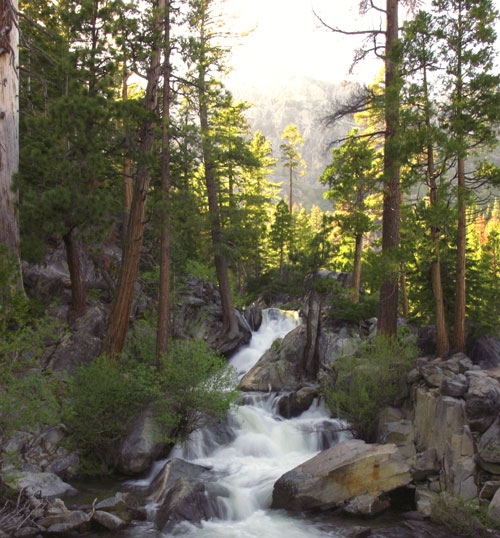Land donation to double UC research forestlands
The University of California will add 4,584 acres of Northern California mixed-conifer forest to its research lands, doubling the size of UC’s research forests, as a result of a land donation approved yesterday (November 16) in Sacramento. The transfer is the largest single acquisition of forestland in the University’s history.
The donation was approved at a meeting of the Pacific Forest and Watershed Lands Stewardship Council, a private foundation that was established in 2004 as part of a Pacific Gas and Electric Company (PG&E) bankruptcy settlement to ensure that over 140,000 acres of California's pristine watershed lands are conserved for the public good and to serve California's young people.
“This four-and-half-thousand acres is a tiny portion of the total PG&E lands, but it’s an enormous boon to UC’s research and outreach capabilities,” said J. Keith Gilless, a professor of forestry and dean of the UC Berkeley College of Natural Resources, which houses the UC Center for Forestry.
The UC proposal focused on learning how California’s working forests in key watersheds can be managed to sustainably provide essential ecosystem and climate benefits over the next century.
The new lands will enable researchers to:
- Learn how different components of forest ecosystems will respond to climate change, increasing fire risks, and invasive species;
- Use and measure a range of forest-management approaches, including reserves, to better understand all the forest ecosystem components;
- Broaden outreach to K-12, community college and university students; researchers; and the public.
“The University’s goal is to harvest knowledge, not timber,” Gilless said.
UC’s proposal received widespread support from the research community, including Yale University, Cornell University, Oregon State University, Northern Arizona University, and the University of British Columbia.
John Battles, a professor of forest ecology at UC Berkeley, said that UC shares the goals expressed in many public comments, which stressed the value of intact forests, tall trees and wildlife habitats. But Battles also noted the importance of research.
“Conservation in this era of change is confronted by the reality that no ecosystem, no matter how remote or wild, is protected. We want to be proactive by learning how to build resilient forests under a changing and stressful climate,” he said.
At Wednesday’s meeting, the Stewardship Council board of directors also approved a donation of 7,016 acres to the California Department of Forestry and Fire Protection (Calfire) for a new state demonstration forest that will be located adjacent to the new UC forest parcel near the Pit River in Shasta County. The Stewardship Council also discussed funding a shared research and outreach facility that would be shared by the two public entities.
Together, the UC and Calfire donations significantly expand the existing research and demonstration state forests owned and operated by state entities and will complement the forest research currently conducted on US Forest Service and National Park Service lands.
“The addition of new forest types and locations broadens the ability of UC Center for Forestry to collaborate with a range of public and private forest owners to conduct critical research and education on forestry management, climate change and other issues affecting the Sierra and Cascade ranges,” Gilless said.
The donation comprises two locations: 3,100 acres near the Pit River in Shasta County, on the west side of the Pit-McCloud watershed, and 1,484 acres in the Lake Spaulding area in Nevada County, near the top of the Yuba-Bear River watershed. Before this donation, the UC Center for Forestry held 5,131 acres over four research sites in Contra Costa County, Plumas, Tulare and El Dorado counties.
Due to land survey work and the California Public Utilities Commission's detailed land-transfer process, the Stewardship Council estimates that UC will take possession of the new lands in approximately one year.
Related story: New Report Highlights Carbon Benefits of Forests
Sources:
John Battles, Professor of Forest Ecology, UC Berkeley, (510) 643-0684
J. Keith Gilless, Dean, UC Berkeley College of Natural Resources; Professor of Forestry, UC Berkeley, (510) 642-7171
Bill Stewart, Director, UC Center for Forestry; Cooperative Extension Forest Management Specialist, (510) 643-3130, (510) 318-0377 (cell)

